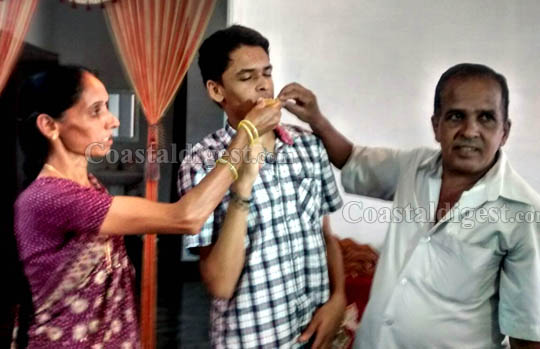Shivamogga, May 17: Without the benefit of tuitions or guides, a boy from industrial town Bhadravathi in Shivamogga district on Monday produced a scorecard every student - and teacher - is proud of: a 100% score. With 625 out of 625 marks, Ranjan BS has become the first student to score cent percent in the SSLC examinations conducted by the Karnataka State Secondary Examination Board.

Ranjan's joy knew no bounds when he checked the result on the web around 3pm. The student from Poornapragna Higher Secondary School, Bhadravathi New Town, had scored 100% in all subjects. Bhadravathi - home to a paper mill and an iron-and-steel factory - is 270 km west of Bengaluru.
Ranjan worked hard to get a good score. His target, he says, was 600 marks. "I studied one subject for six hours daily. I studied till I was thorough in every aspect of all the chapters. I didn't go for tuitions or refer to guides. I solved question papers of previous years, so it supplemented what I studied," he said.
Once he had written the exams, there was no postmortem. "All my friends would discuss the question papers. I never did that. I thought I may have made some mistakes, but realized there was no point in talking about it after I had walked out of the examination hall."
He has a piece of advice for students: have a positive attitude before writing exams. "My achievement has given me a push to achieve excellence in medicine. I was expecting around 600 marks. But scoring cent per cent has given me a sense of fulfilment. It is due to the support given by my parents and school teachers," Ranjan said.
Son of TS Shankara Narayana, a tiles merchant, and SN Triveni, a homemaker, Ranjan studied at Poornapragna Higher Secondary School from LKG to class X. A favourite of all his teachers, he was praised for his interest level, skill in grasping and commitment to achieve excellence. His teachers said he always stood first in the class.
"We never forced him to study extra during exam time," his father said. Ranjan's friends presented him a statuette of former President APJ Abdul Kalam.
Also Read :
SSLC toppers in DK, Udupi aim high
Karnataka SSLC results out: girls outshine boys, Bengaluru Rural on top
Udupi loses top slot in SSLC; DK jumps to 3rd place despite fall in percentage
SSLC toppers: Ranjan scores 625/625, many others score 624, 623...
Mangaluru: Village boy who scored 624/625 in SSLC gives all credit to mom





Comments
Very good Ranjan Keep it up, you may achieve more and more in your future, God bless you
An unbelievable achievement, Great, May God bless you!!
Add new comment